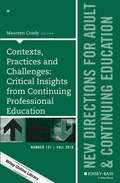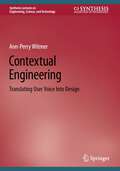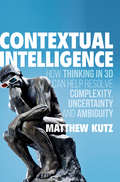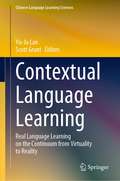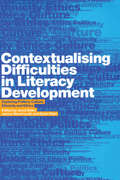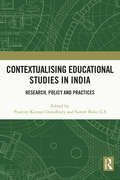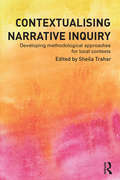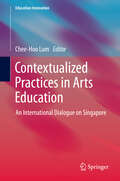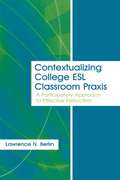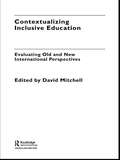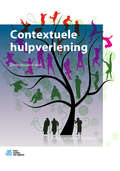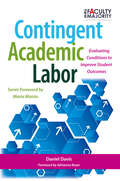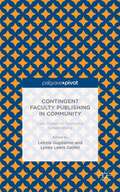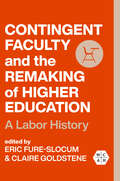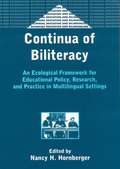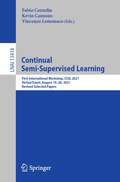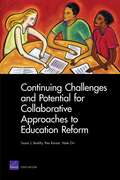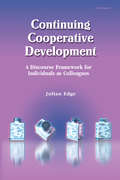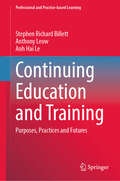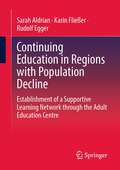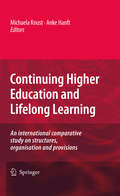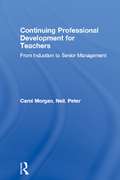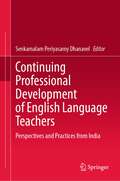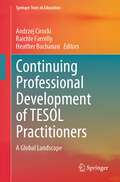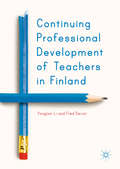- Table View
- List View
Contexts, Practices and Challenges: New Directions for Adult and Continuing Education, Number 151 (J-B ACE Single Issue Adult & Continuing Education)
by Maureen CoadyLifelong learning has become essential not only for professionals, but also for those they serve. Continuing professional education (CPE), an umbrella term used to describe the continuum of formal, nonformal, and informal learning opportunities that enable practicing professionals to continue to learn and to maintain professional competence across their careers, is the focus of this collection. The volume explores, analyzes, questions, and critiques CPE trends and issues across a variety of contexts, and it highlights new thinking and developments to assist providers and practitioners to re-envision their roles and set new directions in the field of CPE. This collection is inspired by the early seminal works of Cyril Houle who advocated that educational researchers and providers of CPE should listen to the experience of professionals as a basis for supporting their professional learning.This is the 151st volume of the Jossey Bass series New Directions for Adult and Continuing Education. Noted for its depth of coverage, it explores issues of common interest to instructors, administrators, counselors, and policymakers in a broad range of education settings, such as colleges and universities, extension programs, businesses, libraries, and museums.
Contextual Engineering: Translating User Voice Into Design (Synthesis Lectures on Engineering, Science, and Technology)
by Ann-Perry WitmerThis book shows readers a new way of thinking about the engineering design process, as well as how to expand their understanding of the role of technical designers in society, whether working with international communities or user populations from their own hometown. As readers build an understanding of Contextual Engineering, this book will challenge them to think about the applicability of the concept more broadly, not only in terms of technical design but in personal and professional interactions with others as well. At the same time, readers will learn techniques to explore their own predispositions and the biases they may not be aware they have, equipping them to interact with others more impartially. This self-reflection process also assists the designer in working with and accepting the uncertainty that is inherent in exploring context.
Contextual Intelligence: How Thinking in 3D Can Help Resolve Complexity, Uncertainty and Ambiguity
by Matthew KutzThis book offers a structured framework for critical thinking and decision making that shows how to use hindsight, insight, and foresight to navigate through complexity. Every organization and every person faces rapid change and complexity. Contextual intelligence - understanding fully the context in which one is operating - teaches the reader how to navigate that complexity and respond appropriately in the face of change (expected and unexpected). The Three-Dimensional (3D) Thinking(tm) framework helps structure critical thinking by showing how to appropriately bring past experience, present intuition, and future ambiguity- in other words: hindsight, insight, and foresight - to bear on any given problem. Kutz offers a way to rationally organize difficult concepts such as complexity, tacit knowledge, and synchronicity into usable and understandable language, but more importantly teaches the reader how to apply these concepts in a very practical and meaningful way with measurable and tangible outcomes. The book also describes in detail 12 behaviors associated with contextual intelligence. Four behaviors are associated with hindsight, four behaviors are associated with insight, and four behaviors are associated with foresight. The book takes the reader through the 12 behaviors and how they relate to 3D Thinking. Cases and anecdotes are used generously to provide examples. Chapters are followed by critical thinking questions and questions related to the cases in the chapters. Furthermore, questions and practical tools are introduced that help the reader assess and determine their level of contextual intelligence.
Contextual Language Learning: Real Language Learning on the Continuum from Virtuality to Reality (Chinese Language Learning Sciences)
by Yu-Ju Lan Scott GrantThis book presents research and developments in the virtual, augmented technology and mixed-reality used in language learning and teaching. It provides the readers with a comprehensive overview of contextual language learning with the support of immersive technology. From theoretical foundations, methodological issues, the features of virtual and augmented reality, and educational practices of language learning, to the future of immersive technology for and research on language learning. During the past two decades, abundant research on different realities has recognized the potential of language learning in virtual, augmented, and mixed-reality environments (Wang et al., 2020; Lin & Lan, 2015). Given insufficient studies of Chinese learning in immersive contexts reported in existing literature, this book includes several excellent studies about using immersive technologies for Chinese learning in addition to other foreign langue learning, such as English as a foreign language (EFL). Since learning Chinese has grown significantly as a global trend, the authors vitally consolidate and synthesize various theoretical foundations, visions, and recent research and practices in the context of Chinese teaching from broader and more diverse perspectives. On the other hand, the chapters about EFL learning also shed light on the research on contextual language learning. Thus, the chapters included in this book will likely provide readers with a deep and extensive understanding of the potential of the smart combination of immersive technologies and language learning. More issues for future research will undoubtedly be inspired by reading the chapters in this book.
Contextualising Difficulties in Literacy Development: Exploring Politics, Culture, Ethnicity and Ethics
by Gavin Reid Janet Soler Janice WearmouthThis book provides a range of interdisciplinary and international perspectives on difficulties in literacy development. The high-profile team of contributors provide ethical and policy discussions, as well as contextualising individual and collective strategies to addressing difficulties in literacy development. The chapters break new ground by encompassing a wide range of perspectives related to critical literacy, socio-cultural, cognitive, and psychological viewpoints, to help inform practice, policy and research into literacy difficulties. Issues addressed include: *the different ways literacy can be conceptualised through social-science based disciplinary perspectives*the issues at the centre of current public and professional debates surrounding literacy difficulties and how these have impacted upon pedagogical responses *the impact of these wider political and social issues on individual students. This reader forms the basis of the Open University’s Difficulties in Literacy Development course, but will also be of interest to postgraduate students, teachers, researchers, education professionals and policymakers who are keen to address difficulties in literacy development.
Contextualising Educational Studies in India: Research, Policy and Practices
by Pradeep Kumar Choudhury Suresh Babu G.SThis volume presents an interdisciplinary framework to map out contemporary educational studies in India. Based on conceptual tools, quantitative methods and ethnographic accounts drawn from extensive fieldwork, it addresses emerging discourses on educational policies, their operation in the everyday functioning of institutions and actual practices in teaching and learning. Individual chapters discuss the intersectionality in the current educational system of region, gender, class, caste and minorities. With comparative perspectives and case studies from across states, including under-studied rural and urban regions of India, the book explores a wide range of issues affecting the educational system, including socioeconomic and gender inequalities; the educational status of tribal settlements in the hinterlands and their respective urban areas; the marginalisation of minorities; challenges in accessing educational avenues and choices; and the model for imparting vocational education and training. It navigates complex sites of discrimination and exclusion in the institutional spaces of the educational system and assesses the consequences of market dynamics and ideological undercurrents. Presenting first-hand information from the field, it evaluates educational policies, practices and research; investigates challenges and failures; provides suggestions and fosters critical thinking for a knowledge society. The findings in this book will be of interest to researchers, scholars and teachers of education, economics, sociology, urban education and the politics of education, as well as of public policy, governance and development studies. It will also be useful to research institutions, policymakers, educationists, social scientists, education professionals, and governmental and non-governmental bodies working on education.
Contextualising Narrative Inquiry: Developing methodological approaches for local contexts
by Sheila TraharNarrative inquiry is growing in popularity as a research methodology in the social sciences, medicine and the humanities. In narrative inquiry, the transparency of interactions between researcher and research participants, together with rich, contextual descriptions, help to shape and structure research texts rendering them engaging and readable. Contextualising Narrative Inquiry argues that all researchers should foreground the importance of the context in which research takes place and develop methodological approaches that are grounded in their local contexts. To do so, they need to pay attention to how knowledge is constructed, shared and understood in those contexts. This is particularly important when contexts have been subjugated historically through colonialism and when local, indigenous ways of knowing have been ignored or dismissed. The contributors to this edited collection have all used narrative inquiry for a range of topics and in a range of contexts, including: Leadership styles of Asian women The Deaf community in the UK Voluntary celibacy in Malta Administrators in Ghanaian higher education Multiculturalism in primary education in Cyprus Teacher identities in Hong Kong The reflective practitioner in higher education in Malaysia. The diversity of the topics illuminates the potential for narrative inquiry to be used to investigate a broad range of issues in many contexts by people with a wide range of backgrounds. A common thread throughout is a reflexive discussion of how each contributor used narrative inquiry as a methodological approach; highlighting not only its affordances, but also the complexities of using it in specific cultural, social and historical contexts.
Contextualized Practices in Arts Education: An International Dialogue on Singapore (Education Innovation Series)
by Chee-Hoo LumThis edited book not only makes a much-needed contribution to research in arts education but also provides a strong grounding of evidential support for Singapore arts education, in contrast to the current state of affairs in arts education in many parts of the world where severe cuts in funding, lackluster support for the arts and imperialist agendas are pervasive. The case of and for Singapore - presented in this edited book through rich descriptions of the dedicated, contextualized practices of arts educators, artists and researchers - offers readers many valuable lessons and reflections on the continued survival and advancement of arts education.
Contextualizing College ESL Classroom Praxis: A Participatory Approach to Effective Instruction (Language, Culture, And Teaching Ser.)
by Lawrence N. BerlinContextualizing College ESL Classroom Praxis: A Participatory Approach to Effective Instruction provides pre-service and in-service teachers with a model for engaging in effective instruction with the variety of students encountered in college English as a second language or foreign language classrooms. Along with the model, the text is designed to
Contextualizing Inclusive Education: Evaluating Old and New International Paradigms
by David MitchellInclusive education is a complex and problematic concept that raises many questions. A team of prominent academics present fresh and critical perspectives on these issues, drawing upon their global resources and knowledge.The over-arching theme of this book is that social, political, economic and cultural contexts play a central role in determining whether or not inclusive education is implemented in a range of regions and countries around the world. A series of original and provocative conclusions is presented, such as: inclusive education means creating a single system of education, which serves all children inclusive education is a site of conflicting paradigms of children with special needs, centering on a psycho-medical model and a socio-political model while many countries seem committed to inclusive education in their rhetoric, legislation and policies, in practice this often falls short. This major landmark resource is suitable for educational policy makers, researchers, teacher educators, students and international agencies with interests in education.
Contextuele hulpverlening
by Karlan van Ieperen-SchelhaasDit boek biedt een eerste kennismaking met de contextuele benadering binnen de hulpverlening. Het helpt studenten en professionals het contextuele gedachtengoed te vertalen in concreet handelen binnen hun beroepspraktijk. Dat kan in vrijwel alle werkvelden binnen het social domein: van ambulante en residentiële hulpverlening aan kinderen, jongeren en volwassenen, tot psychotherapie, pleegzorg, ouderenzorg, onderwijs en leerlingbegeleiding en pastoraat. Contextuele hulpverlening is een toegankelijk, inleidend boek. Deze derde druk behandelt verschillende begrippen die in de voorgaande druk niet of nauwelijks aan de orde kwamen. Het boek onderscheidt zich nog steeds door de eenvoudige wijze waarop het het complexe denken behandelt. Het legt de verschillende begrippen uit, en licht ze toe aan de hand van concrete voorbeelden. In deze druk zijn de voorbeelden geactualiseerd. Ze sluiten daardoor beter aan bij de huidige samenleving, en bij andere gezinsvormen dan de traditionele. Ook zijn voorbeelden gekozen uit meer verschillende werkvelden. Zo sluit het boek aan bij een bredere groep hulpverleners. De opdrachten in het boek dagen studenten en hulpverleners uit om het contextuele gedachtengoed ook in hun eigen familiecontext te verkennen, en de betekenis daarvan voor hun beroepspraktijk te onderzoeken. Karlan van Ieperen – Schelhaas is orthopedagoog en docent Social Work aan de Christelijke Hogeschool Ede.
Contingent Academic Labor: Evaluating Conditions to Improve Student Outcomes (The\new Faculty Majority Ser.)
by Daniel B. DavisContingent Academic Labor is a concise guide that offers higher education professionals a way to measure the degree of equality taking place in work environments for non-tenure track faculty across institutional settings. It frames the relevant issues and examines the nationwide situation facing contingent faculty across the professional landscape. The goal is to review contingent faculty treatment, and offer a standardized way to identify both equitable and unjust practices that impact adjunct faculty and their students by extension.The main feature of this guide is The Contingent Labor Conditions Score, a tool to help evaluate current labor practices that impact adjuncts in both positive and negative ways. The report card measures 3 areas of labor conditions:*Material Equity: Pay, job security and benefits*Professional Equity: Opportunities for advancement, professional development, academic freedom, sense of professional inclusion, and job satisfaction*Social Equity: Gender and race parity between contingent and non-contingent faculty in proportion to the population servedThis book will be useful for administrators and labor organizers alike in assessing the degree of exploitation, or empowerment, in their own institution. The Contingent Labor Conditions Score, as a standardized tool, will serve audiences on both sides of the discussion in creating positive steps forward, improving not only contingent faculty working conditions, but ultimately improving student outcomes.
Contingent Faculty Publishing in Community: Case Studies for Successful Collaborations
by Lynée Lewis Gaillet Letizia GuglielmoContributors argue that the key to innovative teaching and scholarship lies in institutional support for the contingent labor force, and they encourage contingent faculty to organize self-mentoring groups, create venues for learning/disseminating their experiences and findings, and connect scholarship to service and teaching in novel ways.
Contingent Faculty and the Remaking of Higher Education: A Labor History (Working Class in American History)
by Erin Hatton Elizabeth Tandy Shermer Eric Fure-Slocum Sue Doe Claire Raymond Gary Rhoades Steven Shulman Joe Berry Helena Worthen Steven Parfitt Claire Goldstene Elizabeth Hohl Gwendolyn Alker Aimee Loiselle Diane Angell Miguel Juarez Maria C Maisto Anne Wiegard William A Herbert Joseph van der Naald Jeff Schuhrke Anne McLeer Trevor Griffey Naomi R Williams Jiyoon ParkAn educational crisis from its origins to present-day experiences In the United States today, almost three-quarters of the people teaching in two- and four-year colleges and universities work as contingent faculty. They share the hardships endemic in the gig economy: lack of job security and health care, professional disrespect, and poverty wages that require them to juggle multiple jobs. This collection draws on a wide range of perspectives to examine the realities of the contingent faculty system through the lens of labor history. Essayists investigate structural changes that have caused the use of contingent faculty to skyrocket and illuminate how precarity shapes day-to-day experiences in the academic workplace. Other essays delve into the ways contingent faculty engage in collective action and other means to resist austerity measures, improve their working conditions, and instigate reforms in higher education. By challenging contingency, this volume issues a clear call to reclaim higher education’s public purpose. Interdisciplinary in approach and multifaceted in perspective, Contingent Faculty and the Remaking of Higher Education surveys the adjunct system and its costs. Contributors: Gwendolyn Alker, Diane Angell, Joe Berry, Sue Doe, Eric Fure-Slocum, Claire Goldstene, Trevor Griffey, Erin Hatton, William A. Herbert, Elizabeth Hohl, Miguel Juárez, Aimee Loiselle, Maria C. Maisto, Anne McLeer, Steven Parfitt, Jiyoon Park, Claire Raymond, Gary Rhoades, Jeff Schuhrke, Elizabeth Tandy Shermer, Steven Shulman, Joseph van der Naald, Anne Wiegard, Naomi R Williams, and Helena Worthen
Continua of Biliteracy
by Nancy H. HornbergerBiliteracy - the use of two or more languages in and around writing- is an inescapable feature of lives and schools worldwide, yet one which most educational policy and practice continue blithely to ignore. The continua of biliteracy featured in the present volume offers a comprehensive yet flexible model to guide educators, researchers, and policy-makers in designing, carrying out, and evaluating educational programs for the development of bilingual and multilingual learners, each program adapted to its own specific context, media, and contents.
Continual Semi-Supervised Learning: First International Workshop, CSSL 2021, Virtual Event, August 19–20, 2021, Revised Selected Papers (Lecture Notes in Computer Science #13418)
by Fabio Cuzzolin Kevin Cannons Vincenzo LomonacoThis book constitutes the proceedings of the First International Workshop on Continual Semi-Supervised Learning, CSSL 2021, which took place as a virtual event during August 2021.The 9 full papers and 0 short papers included in this book were carefully reviewed and selected from 14 submissions.
Continuing Challenges and Potential for Collaborative Approaches to Education Reform
by Nate Orr Susan J. Bodilly Rita KaramThe Ford Foundation's Collaborating for Education Reform Initiative (CERI) provided grantees with funds, guidance, and technical assistance to develop collaboratives and carry out activities to improve teaching and learning. A second effort, CERI 2, laid down a new set of goals for grantees. RAND Corporation researchers evaluated the initiative.
Continuing Cooperative Development: A Discourse Framework for Individuals as Colleagues
by Julian EdgeIn Continuing Cooperative Development, a series of guided tasks helps the reader acquire specific skills of listening and responding that, in turn, help a speaker to express and articulate thoughts and plans that lie just beyond what they knew that they knew. By adopting a certain style of speaking and listening to colleagues for agreed periods of time, motivated professionals can take individual control of their own development and increase the feeling of collegiality in their workplace. Continuing Cooperative Development draws on Edge's experience of more than ten years using this framework worldwide and provides authentic examples to guide the reader. This interactive framework is demonstrated in the book as part of a reflective teaching approach in response to everyday classroom problems, and also as part of a more formal, action-research approach to the formulation of local educational theory. The key theme of this book is the power of non-judgmental discourse to facilitate the development of ideas and action, accessing both cognitive and emotional intelligence. The transcribed and interpreted data of authentic interactions from the Americas, Europe, and Asia serve as evidence for the argument and as guidelines for implementation. The work is set in the field of TESOL, although its relevance reaches across discipline boundaries. The teachers featured in the book have duties ranging from the instruction of young learners to the supervision of doctoral research. The common denominator is that these people are motivated educators, committed to extending their own understanding and developing their own style of being an aware professional.
Continuing Education and Training: Purposes, Practices and Futures (Professional and Practice-based Learning #36)
by Anh Hai Le Stephen Richard Billett Anthony LeowThis book elaborates on the project of continuing education and training (CET), its purposes, practices and prospects for future models and approaches. As such, it also seeks to elaborate the needs for a means by which this important educational sector can achieve its goals both now, and in the near future. Often seen as a supplementary or additional educational sector, CET is gaining increased relevance and importance given the need for individuals to remain employable across lengthening working lives, enterprises needing to maintain their viability and nation states requiring skilled workforces to deliver the goods and services they require. Drawing upon an extensive review of literature and grounded in a national multi-phased investigation of how CET is currently provided, might be enhanced and envisaged for the future, this book provides both clear premises for proceeding with this important educational sector in an era of growing concerns about the currency of workforce capacities, and sustaining employability across lengthening working lives. It also provides advice on how its goals can be achieved drawing upon evidence from this investigation, and associated literature from the broader field.
Continuing Education in Regions with Population Decline: Establishment of a Supportive Learning Network through the Adult Education Centre
by Rudolf Egger Sarah Aldrian Karin FließerIn this book, the basic conditions for local learning are described using the example of two regions in Styria and related to demographic and spatial factors. Based on this, possibilities for successful local learning in peripheral regions are elaborated and the role of the Adult Education Centre in the regions of south-eastern Styria and Liezen is analysed.The contentBuilding a supportive learning network for people in peripheral regions - Regional profiles - Basic educational conditions in the regions of Liezen and Southeast Styria - Profile of the Adult Education Centre of Styria - The role of the Adult Education Centre in the regions of Liezen and Southeast Styria - Local learning - Challenges and opportunities from the perspective of regional experts - Social and regional benefits of the Adult Education Centres in the districts of Liezen and Southeast StyriaThe authorsSarah Aldrian and Karin Fließer are research assistants at the Institute for Education and Educational Science at the Karl-Franzens-University Graz.Dr. Rudolf Egger is a university professor for empirical learning environment research and university didactics at the Institute for Education and Educational Science at the Karl Franzens University of Graz.
Continuing Higher Education and Lifelong Learning: An international comparative study on structures, organisation and provisions
by Michaela Knust Anke HanftThis comparative survey was conducted in 2006 and shows the structure, organisation and types of provisions of continuing higher education in six countries (in alphabetical order): Austria, Finland, France, Germany, the United Kingdom and the United States of America. In addition to that, other "important players" in the field of lifelong learning are included, such as corporate universities and research associations. All country studies analyse the functions and restraints of continuing higher education. This is done by analysing a) the relevant framework conditions in each country, b) the management (organisational structures, financial management, marketing, quality assurance, programme portfolios, learn settings etc.) and c) the types of provisions (face-to-face lessons, online learning, blended-learning; admission to courses; accreditation of prior learning; credit points etc.). The summary of the country studies finally shows a survey of the individual situations and displays the similarities and differences. It draws conclusions for the activities of higher education institutions as lifelong learning institutions.
Continuing Professional Development for Teachers: From Induction to Senior Management (Kogan Page Teaching Ser.)
by Carol Morgan Peter NeilThis volume is designed for teachers, whether just setting out or climbing the ladder. It examines the complex set of options and requirements facing teachers, from qualifying as a teacher to developing skills through middle and senior roles, and continually improving teaching skills.
Continuing Professional Development of English Language Teachers: Perspectives and Practices from India
by Senkamalam Periyasamy DhanavelThis book provides a comprehensive understanding of India's continuing professional development (CPD) landscape. It examines the issues surrounding the professional development of English language teachers in India at the tertiary level from multiple perspectives. Further, it evaluates various models of continuing professional learning (CPL) and emphasizes the transformative model as a solution to the social, administrative, or other impediments teachers encounter in their lives. Importantly, it presents examples, solving academic and non-academic problems in formal and informal, and face-face and technology-mediated forms of teaching and learning by teachers of English in different contexts. It discusses the latest developments in the literature related to the transformative and reflective approach to classroom problems faced by teachers on the ground such as classroom environment, students' socio-economic background, teachers education, and teacher assessment. Also, it positions continuing professional development (CPD) as having transformative power in teaching English in India and how it can improve students' learning opportunities. The book is relevant to English language teachers, teacher educators, and researchers in India and across the globe to address significant issues in the field: how to handle every classroom situation and how to train oneself as a teacher as well as a teacher educator.
Continuing Professional Development of TESOL Practitioners: A Global Landscape (Springer Texts in Education)
by Andrzej Cirocki Heather Buchanan Raichle FarrellyThis textbook serves as a current and comprehensive resource on effective Continuing Professional Development (CPD) for TESOL practitioners in various contexts around the world at various stages in their careers. The practices described by language teachers, teacher educators and professional development providers in this book offer a vision of critical issues to consider when designing and evaluating professional development opportunities. Effective professional development requires careful planning informed by the realities of the local context and the specific needs of the teachers. This textbook is designed to support those who provide professional development opportunities by presenting global perspectives on professional development for a range of teaching contexts at different language levels. Each chapter includes a discussion about the type and source of support available in the given context, as well as a reflection on the challenges that exist for both teachers and CPD providers. These insights serve to help CPD designers and providers as they problematize teacher development opportunities in their context. Each chapter concludes with a synthesis of the strengths of CPD in the local context and a discussion of future directions that target opportunities for transformation and improvement. This volume celebrates teachers, teacher educators and CPD providers around the world. High-impact practices are presented from fifteen countries: Cameroon, Canada, Costa Rica, Indonesia, Kazakhstan, Malta, New Zealand, Norway, Oman, Qatar, South Africa, South Korea, Sri Lanka, Tanzania and the United States of America.
Continuing Professional Development of Teachers in Finland
by Fred Dervin Yongjian LiThis book examines continuing professional development (CPD) of teachers in Finland. As one of the best-performing countries in terms of education, the Finnish education system is often revered and held up as an example to follow. However, the authors argue that CPD actually constitutes the Achilles’ heel of this ‘miraculous’ system, demonstrating that in fact it is a victim of contradictory discourses and actions among decision-makers, teacher educators and practitioners. Including extensive interviews from CPD providers, teachers and other educational actors, the authors critically discuss the ‘wonders’ of Finnish education, in the process debunking various myths created both inside and outside Finland. The authors also call for a new approach to comparative and international education. Based on over 20 years of experience in Finnish education, this pioneering book will be of interest and value to students and scholars of Finnish education, continuing professional development and international education branding more generally.
